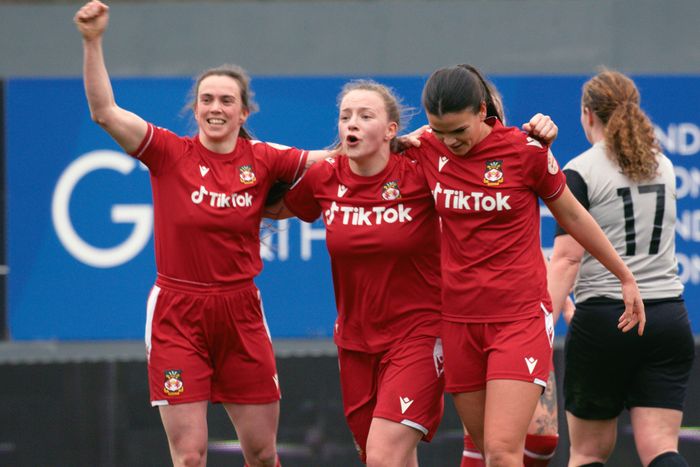
The first season of FX/Hulu’s sports docuseries Welcome to Wrexham was a bit of a lark, a newborn colt of a show that gamely wobbled and sprawled across 18 episodes to eventually find its footing. Its journey to assured storytelling mirrored that of its initial stars, actors Ryan Reynolds and Rob McElhenney, as they navigated the complexities of taking long-distance ownership of the historic Welsh football team Wrexham AFC. The giddy co-hosts learned right alongside their (presumably) soccer-naïve American audience, constantly mocking themselves for their ignorance of Welsh language, culture, and history and of football in general.
Although a quippy pair of Hollywood A-listers might have been the show’s initial draw, season two wisely shifted Reynolds and McElhenney from the story’s center to its sidelines to broaden its scope while the Red Dragons continued their ultimately successful quest for promotion to a higher echelon of the English Football League. The Wrexham in Welcome to Wrexham has always been both the Town (one of the team’s many nicknames) and the town itself, providing a clear path to telling stories of life beyond the locker room and playing field. Thanks to the flexibility that comes with having 15 episodes of varying lengths, the second season could highlight everything from a 1934 mining disaster that reverberates through the community today, to players’ family lives and relationships with their parents, to a gratifying two-episode arc about Wrexham AFC Women, a.k.a. the Robins, whose unprecedented undefeated record in the 2022–23 season won them promotion to the Welsh Football League’s highest tier, Adran Premier.
The triumphant concluding moments of the second-season finale feature a well-earned, long-awaited victory parade after the Red Dragons clinch automatic promotion from the lowly, demoralizing National League to the more prestigious, lucrative League Two. They also confirm that Wrexham’s chief rivals, Notts County FC, played their way to promotion to League Two and will be getting a fair bit of screen time next season. There were hints throughout this season that Notts County might play a larger role on the show down the line, and the finale tees up this development by incorporating the series’s first-ever talking-head interviews with head coach Luke Williams and players Cedwyn Scott and Macaulay Langstaff.
The finale doesn’t devote as much time to the women’s team, but the moments when these players do appear — popping up in the stands throughout the men’s final match and celebrating alongside their colleagues atop a double-decker bus on the parade route — suggest that we haven’t seen the last of them, either. With its recently confirmed third season set to start airing this spring, Welcome to Wrexham is looking at a golden opportunity: bring the Robins closer to the center of the story, potentially expanding viewership and continuing to make good on the team owners’ promises for significant long-term improvements for the women’s team. Here’s a chance to leverage the show’s popularity to further increase interest in the women’s team, which could create a positive feedback loop of building viewership for the show and deepening fan investment in both teams.
Including more of the women’s team would also expand on a significant storytelling element of season two: the ongoing examination of cultural assumptions about masculinity. The first season touched on the subject here and there, but this time around, everything has been on the table, from feelings, fatherhood, and gender equity to parent-child relationships and mental health. Reynolds chokes up while talking about how meaningful it is for his daughter to see Wrexham’s women’s team win crucial matches. McElhenney and his two moms talk about how different the social landscape is now from his childhood and teen years in the 1980s and ’90s. On the players’ side, Ollie Palmer and both of his parents speak candidly about his dad’s coming out in middle age, and Paul Mullin, Jordan Davies, and Anthony Forde all consider themselves fathers first in storylines about childhood autism diagnosis, pregnancy loss, and an earth-shattering family medical crisis. Presenting a variety of ways to be a different kind of sports guy alongside the Red Dragons’ historic season intensifies viewers’ understanding of what makes the entire Wrexham ecosystem so special while maintaining the series’ alignment with the earnest highs and lows of classic sports stories. What better way for Welcome to Wrexham to be a show about a different breed of sports guy than to make room for its sister team?
Incorporating a bigger arc about the women’s team in its first season post-promotion would keep Wrexham’s storytelling fresh and serve as a natural next step after the standout season-two episodes “Ballers” and “Yn Codi.” These work nicely as a two-part pivot introducing and getting us hooked on compelling key players, most notably superstars Rosie Hughes, Delyth Morgan, Mia Roberts, and Lili Jones. Hughes is a goal-making wizard, the highest-scoring player across both the men’s and women’s teams (yes, even higher than “Super” Paul Mullin). Morgan’s heroics as goalkeeper save the team’s bacon in its toughest matches. As the daughter of former Red Dragons captain Neil Roberts, Mia Roberts has Wrexham football running through her veins. And at just 17 years old, Jones displays unselfconscious wisdom beyond her years and establishes herself as a mental-health advocate by speaking openly about her father’s death by suicide.
These talented, dogged players who have made it to the highest echelon of women’s Welsh football playing their home matches on a muddy, poorly drained pitch on the outskirts of Wrexham are finally being paid to play the game they love — what viewer wouldn’t want to see more about their lives on and off the pitch? Welcome to Wrexham’s presentation of the Robins, both as a team and as individuals, is entirely of a piece with its treatment of the Reds and its season-long work of broadening the scope of the show. All it needs to do is continue moving that ball down the field.

